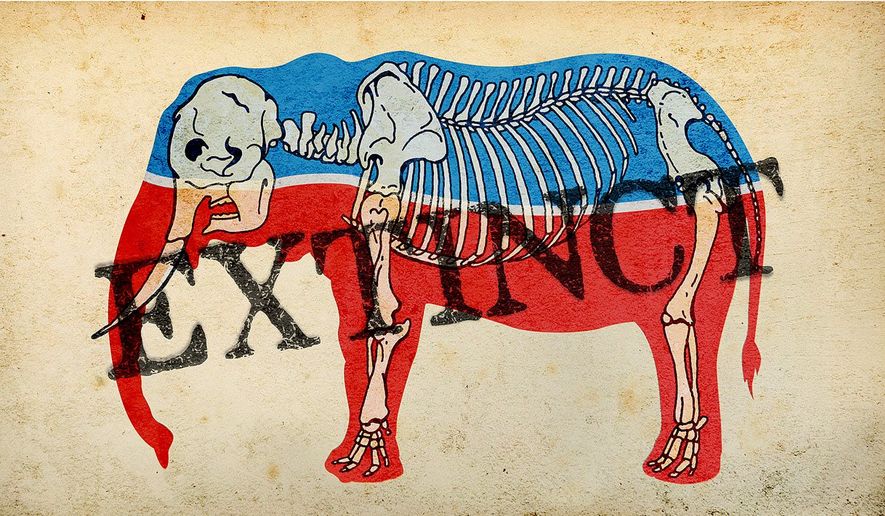OPINION:
Having refused to repeal Obamacare, the Republican Party is dead, as was the Whig Party in 1854 after it colluded in the passage of the Kansas-Nebraska Act which opened these territories to slavery.
Republican majorities in both Houses of Congress as well as control of legislatures and governorships in 26 states veil the fact that, in 2017, there are no longer reasons to vote Republican any more than there were to vote Whig after 1854.
The Republican Party’s successes in recent electoral cycles were due to the American people’s desire not to be governed by a ruling class, headed by the Democratic Party, which is restricting, insulting and impoverishing the country. Republican voters were hopeful but doubtful. In the 2016 Republican primaries the overwhelming majority of votes went to candidates least tied to the party establishment.
In 1854, the Whig Party finished itself off because its support of Kansas-Nebraska was the last in a long line of acquiescences to the Democratic Party’s agenda regarding slavery and expansion. Obamacare is a principal part of what Democratic rule imposed on America. By embracing it in 2017, the Republican Party removed any prospect that it might serve as an alternative to Democratic rule.
Political parties live and die by their capacity to represent their constituents’ sentiments. In our time, there is no doubt that the Democratic Party reflects its voters, any more than there was in the first half of the 19th century.
But, now as then, opposition to the Democratic Party has no viable political vehicle. The Whigs, like today’s Republicans, contained a substantial percentage of prominent people whose interests and ideas are hardly distinguishable from those of Democrats.
Hence, to Whigs such as William Seward, John C. Fremont and Salmon P. Chase, passage of the Kansas-Nebraska Act proved that, if they really were going to oppose slavery in the territories, if they were really going to counter the Democratic foreign policy’s amorality, they would have to leave some of their colleagues and found a new party.
They called the new party “Republican.” They dedicated it to fighting slavery and polygamy — “the twin relics of barbarism.” Because there was no doubt that this core of “conscience Whigs” meant it, they drew in a host of others, plus some fallen-away Whigs, like Abraham Lincoln, for whom Kansas-Nebraska had been the last straw.
By the next election cycle, the party fielded a presidential candidate. By the one after that, they won the presidency in a three-way race.
Today’s America does not need a “third party.” When Congressional Republicans and Democrats together affirmed Obamacare; as they set about financing the health insurance industry in explicit contradiction of law; as every branch of the permanent government continues to have its unaccountable way with Americans; as a foreign policy of indecisive warfare continues despite popular opposition, there is no doubt that today’s America is ruled by a single ruling party and that the Republican Party is part of that party rather than an alternative to it.
Why vote Republican when that results, rhetoric aside, in being governed as by Democrats? America needs a true alternative to our ruling Uni-party, a true second party.
The New Party would be about returning America to the rule of law under the Constitution. That would mean rolling back the judicial-administrative state that is restricting economic activity, religious freedom and imposing an alien morality on America.
The party would tailor ingress of foreign labor to America’s needs, and treat citizenship as a privilege. Its foreign policy would aggressively defend vital interests while ending indecisive warfare.
There is no doubt that the New Party’s core would be formed by people who currently label themselves Republican, just as the original Republicans were mostly re-labeled Whigs, or that the new party would pursue much of what the Republicans have purported to pursue, just as the original Republicans pursued much of the old Whigs’ agenda.
The crucial difference, now as 160 years ago, is that the New Party would cast aside its links to the establishment, would incorporate new concerns, and that it would mean what it said.
Were such a New Party to present a presidential candidate in 2020, the only certainty is that the Republican Party’s standard bearer would receive fewer popular votes than either the Democratic Party’s or the New Party’s candidates. Since neither of these two would likely receive a majority of electoral votes, the House of Representatives would have to choose between them, each state casting one vote.
The majority of states have a majority of Republican Congressmen. Whoever of these voted for the Democrat would cut himself off from his district. Whoever voted for the New Party candidate would thereby be applying for membership.
• Angelo M. Codevilla is professor emeritus of international relations at Boston University.




Please read our comment policy before commenting.